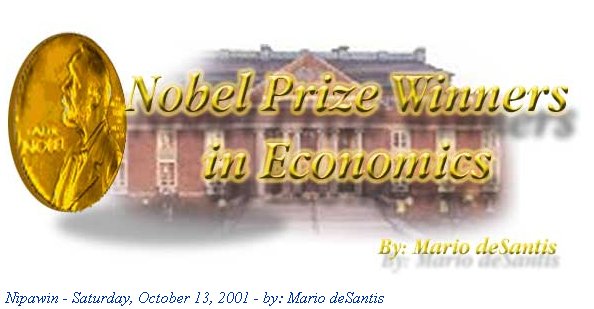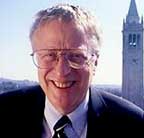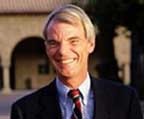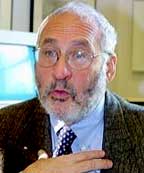Learning Stories
by
Mario deSantis
mariodesantis@hotmail.com
“I am a Canadian, free to speak without fear, free to worship in my own way, free to stand for what I think right, free to oppose what I believe wrong, and free to choose those who shall govern my country.” - -The Rt. Hon. John Diefenbaker, Canadian Bill of Rights, 1960
“The whole judicial system is at issue, it's worth more than one person.”--Serge Kujawa, Saskatchewan Crown Prosecutor, 1991
“The system is not more worth than one person's rights.”--Mario deSantis, 2002
Ensign Stories © Mario deSantis and Ensign
|
|
"Rather than muzzle myself, or be muzzled, I decided to leave the World Bank" -- Professor Joseph Stiglitz Three Americans are sharing the just announced Nobel Prize for Economics: George A. Akerlof, professor of economics at the University of California at Berkeley; A. Michael Spence, an economist and former dean of the Stanford Business School; and Joseph E. Stiglitz, professor of economics at Columbia University. In announcing the winners, the Royal Swedish Academy of Sciences said "their work transformed the way economists think about the functioning of markets." Their theories incorporated 'imperfect information' into economics, a concept at odds with the neoclassical economics' credo that markets are all-knowing and self-correcting. I want to point out that financier George Soros is potentially deserving a Nobel Prize as well as he has added the 'gambling casino' component to the working of financial markets.
We compliment all the Nobel Prize winners, but mostly we want to recognize Joseph Stiglitz for bringing intelligent common sense to the science of economics. References Nobel honors work on information's role in economics, David A. Sylvester, Mercury News October 11, 2001 http://www.siliconvalley.com/docs/news/depth/nobel101101.htm 3 Americans Awarded Nobel for Economics, by Louis Uchitelle, New York Times, October 11, 2001 http://www.nytimes.com/2001/10/11/business/11ECON.html?ex=1003464000&en=9d163284abca76aa&ei=5040&partner=MOREOVER Interview with George Soros. He is a billionaire and philanthropist and Chairman of Soros Fund Management LCC. PBS Frontline, Spring 1999 http://www.pbs.org/wgbh/pages/frontline/shows/crash/interviews/soros.html UC Berkeley Professor Shares 2001 Nobel Prize in Economics, University's Second Win In a Row, ATTENTION: National editors, October 10, 2001 http://www.ascribe.org/cgi-bin/spew4th.pl?fname=2001-10/20011010.130553&time=13:22+Pacific+Time&year=2001&public=1 Stanford Business School's A. Michael Spence Wins Nobel Prize in Economics http://library.northernlight.com/FD20011010920000106.html?cb=0&dx=1006&sc=0#doc WHITHER REFORM? (Excerpts), by Joseph Stiglitz http://econc10.bu.edu/economic_systems/Theory/Transition/joseph_stiglitz.htm |

 George
Akerlof has been recognized for his research that borrows from
sociology, psychology, anthropology and other fields to determine
economic influences and outcomes. In discounting the work of our
powerful neoclassical economists, Akerlof has stated "just as
traditional French cooking does not use seaweed or raw fish, so
neoclassical models do not make assumptions derived from psychology,
anthropology, or sociology. I disagree with any rules that limit the
nature of the ingredients in economic models."
George
Akerlof has been recognized for his research that borrows from
sociology, psychology, anthropology and other fields to determine
economic influences and outcomes. In discounting the work of our
powerful neoclassical economists, Akerlof has stated "just as
traditional French cooking does not use seaweed or raw fish, so
neoclassical models do not make assumptions derived from psychology,
anthropology, or sociology. I disagree with any rules that limit the
nature of the ingredients in economic models."  Michael
Spence discovered that under certain conditions well-informed
players can improve their market outcome by 'signaling' their
private information to those who know less. He is now in private
business and reaps the rewards of his discovery as he sits on the
boards of Nike, General Mills, and Siebel Systems.
Michael
Spence discovered that under certain conditions well-informed
players can improve their market outcome by 'signaling' their
private information to those who know less. He is now in private
business and reaps the rewards of his discovery as he sits on the
boards of Nike, General Mills, and Siebel Systems.  Joseph
Stiglitz is a singular character as he decided to resign as chief
economist of the World Bank rather than serve the flawed and selfish
interest of this bank. He has been a vocal critic of the World
Bank's policies and he could not contain his embarrassment as this
bank would give loans under a world wide common policy which
included slashed governmental budgets and high interest rates. And
it is interesting to note that just few days ago Stiglitz criticized
Bush's tax cuts to stimulate the economy. Here we have a country
under shock, with so many people out of work, and president Bush
offers a tax cut package to stimulate the economy. Anyhow, Stiglitz
admires the Chinese incremental and non ideological approach to
their market economy. He says that the Chinese had the wisdom to
"know they didn't know what they were doing." In contrast, the
Russians have tended towards a more radical reform guided by
American prophets armed with clean neoclassical textbook models. He
says that the Russians have learned the hard way to appreciate the
old saying: "It's not so much what you don't know that can hurt
you-but what you know that ain't so."
Joseph
Stiglitz is a singular character as he decided to resign as chief
economist of the World Bank rather than serve the flawed and selfish
interest of this bank. He has been a vocal critic of the World
Bank's policies and he could not contain his embarrassment as this
bank would give loans under a world wide common policy which
included slashed governmental budgets and high interest rates. And
it is interesting to note that just few days ago Stiglitz criticized
Bush's tax cuts to stimulate the economy. Here we have a country
under shock, with so many people out of work, and president Bush
offers a tax cut package to stimulate the economy. Anyhow, Stiglitz
admires the Chinese incremental and non ideological approach to
their market economy. He says that the Chinese had the wisdom to
"know they didn't know what they were doing." In contrast, the
Russians have tended towards a more radical reform guided by
American prophets armed with clean neoclassical textbook models. He
says that the Russians have learned the hard way to appreciate the
old saying: "It's not so much what you don't know that can hurt
you-but what you know that ain't so."